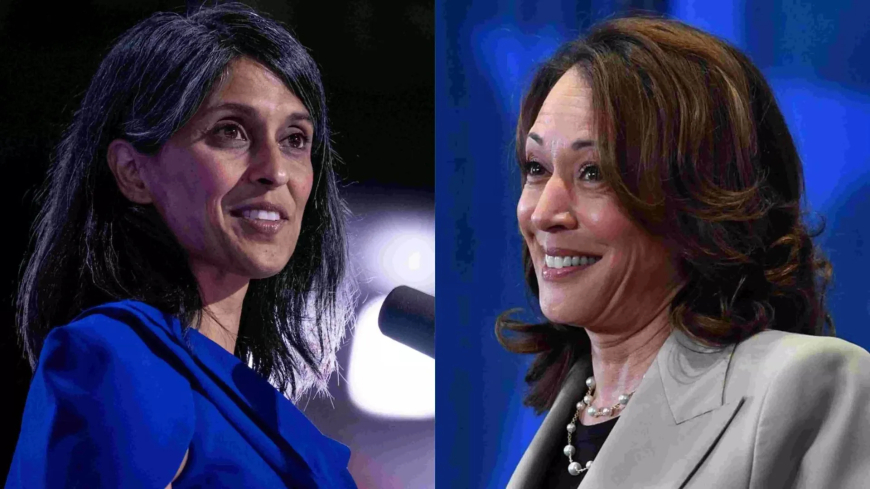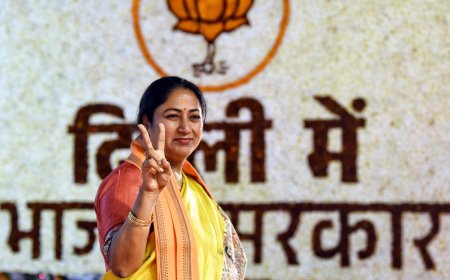"How Usha Vance and Kamala Harris’ Indian Heritage Sparked a Tamil vs Telugu Clash on Social Media"
Discover how the Indian cultural roots of Usha Vance and Kamala Harris ignited a spirited debate between Tamil and Telugu communities on social media. This article explores the dynamics behind this online cultural clash, looking into how these high-profile figures' backgrounds fueled contrasting perspectives and pride within the Indian diaspora.

How Usha Vance and Kamala Harris’ Indian Heritage Sparked a Tamil vs Telugu Clash on Social Media
Introduction
Usha Vance, wife of U.S. Senator J.D. Vance, and Vice President Kamala Harris, both have strong Indian roots, yet their backgrounds differ significantly. Usha Vance is of Telugu heritage, while Kamala Harris has Tamil ancestry. These distinctions led to an unexpected social media clash, sparking a spirited conversation between Tamil and Telugu communities about cultural pride and identity. Here’s a breakdown of how this online debate unfolded.
1. Cultural Backgrounds at the Forefront
- Usha Vance’s Telugu Heritage: Usha Vance hails from a Telugu-speaking Indian family. Her background celebrates the distinct traditions and language of Andhra Pradesh and Telangana.
- Kamala Harris’ Tamil Heritage: Kamala Harris, with her Tamil roots, connects strongly with Tamil Nadu’s unique language, culture, and customs. This background is also central to her identity.
- Community Pride on Social Media: The conversation around their cultural backgrounds ignited cultural pride on social media, as members of the Telugu and Tamil communities showcased their heritage with passion.
2. The Role of Social Media in Amplifying Cultural Identity
- Platforms Like Twitter and Instagram: Social media platforms such as Twitter and Instagram became the stage where people from both communities shared posts, memes, and stories reflecting their pride in Telugu or Tamil heritage.
- Hashtags Fueling the Discussion: Hashtags related to Tamil and Telugu culture trended during the height of this debate, with users adding to the discussion by sharing facts, folklore, and festivals unique to their communities.
- Memes and Viral Content: Social media users created memes and engaging posts highlighting the unique aspects of Telugu and Tamil cultures, adding humor to the conversation while keeping it light-hearted.
3. Cultural Comparison Turning Into Rivalry
- Comparisons of Language and Tradition: The pride surrounding Telugu and Tamil identities led to inevitable comparisons, from language richness to cultural rituals, traditions, and achievements.
- Healthy Rivalry or Tension?: While the conversation started as a fun way to celebrate two Indian cultures, it quickly turned into a debate, with some users feeling their heritage wasn’t equally respected or appreciated.
- Increased Spotlight on Differences: The focus on these differences brought out opinions that sometimes seemed more competitive than celebratory, which added a layer of tension to the discussions.
4. High-Profile Figures Fueling Cultural Pride
- Usha Vance’s Public Persona: Usha Vance’s presence as the wife of a prominent U.S. senator and her Telugu heritage sparked interest in Telugu culture, with many Telugu speakers taking pride in her background.
- Kamala Harris as a Tamil Icon: Kamala Harris, as the first Vice President of the United States with Tamil heritage, has long been an icon for the Tamil community, inspiring Tamilians across the globe.
- Admiration from Both Sides: Both figures are admired by their communities for their achievements, making them symbols of pride and success for Indians in America and beyond.
5. Celebrating Heritage Through Food and Festivals
- Telugu and Tamil Festivities: Social media discussions highlighted popular Telugu and Tamil festivals, such as Ugadi and Pongal, as users celebrated these cultural events that shape their identities.
- Traditional Foods Making an Appearance: The debate also extended to cuisine, with fans of Telugu and Tamil foods showcasing dishes unique to their regions, from biryanis to spicy curries.
- Bonding Over Shared and Unique Traditions: This aspect of the debate allowed both sides to showcase the beauty of their regional customs, leading to an appreciation for the rich diversity within Indian culture.
6. The Bigger Picture of Cultural Identity in the Diaspora
- A Shared Indian Identity Amidst Regional Pride: Despite the rivalry, the debate highlighted a shared Indian identity, celebrating diversity within the Indian diaspora, which consists of multiple languages, customs, and traditions.
- Strengthening Connections Through Pride: This online exchange, although divisive at times, ultimately brought together Indians across the globe, helping each side learn about and appreciate the other’s culture.
- The Importance of Representation: The prominence of individuals like Usha Vance and Kamala Harris emphasizes the value of cultural representation, showing how shared backgrounds can resonate deeply within diaspora communities.
7. Conclusion: An Opportunity for Unity and Understanding
- A Positive Takeaway from the Debate: While the Tamil vs Telugu social media clash had its moments of rivalry, it underscored the importance of celebrating cultural roots, offering a platform for people to connect over their shared heritage.
- Embracing Diversity Within Indian Culture: Ultimately, this social media moment was a reminder of the diversity within Indian culture and the beauty of its many regional expressions.
- Looking Forward to Cross-Cultural Appreciation: As the diaspora continues to grow and evolve, there is hope for greater mutual appreciation and understanding across different cultural backgrounds, fostering unity in diversity.
This conversation brought to light the layers of identity within Indian culture and highlighted how deeply-rooted traditions, even within the same country, can create both pride and lively rivalry in the diaspora.
What's Your Reaction?

































































